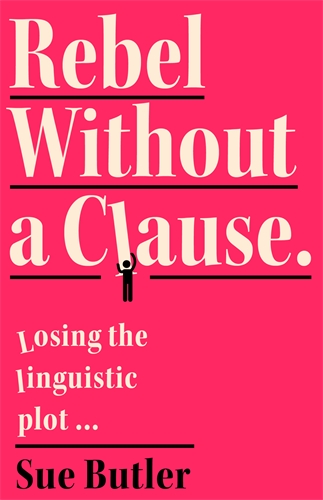Rebel without a clause by Sue Butler

We expect Sue Butler, lexicographer, and former Editor of the Macquarie Dictionary to be outraged by our ongoing mutilation of the English language. Her title promises neither satire nor indignation but instead, she makes measured observations of both the randomness and reasoning for mistakes. With each short, sharp chapter, she delights in the evolution of language, likening it to a game of Chinese whispers, and only mildly irritated by a more colourful phrase resulting from a slip up. Rather than admonishing living speakers for the odd moment when clarity went awry, she writes,
"... I would hope that my swings from tolerant to outraged are measured and balanced. Otherwise I will have become that creature of strident language purity, the pedant."
Her reflections help the reader trip backwards and forwards in time to rediscover lost words. Barely a passage is given to the cry ‘Bar’ or ‘Barley’ meaning a “truce” but the lost word conjures up the sweaty excitement of our childhood running games. As elsewhere, Butler is conflicted – impressed by the word’s appropriation by children from the French “Parlez”, or saddened by it falling into disuse.
It is surprising how much delight she voices for the metonymy created when a word is mistakenly used or mis-pronounced. She lists our sunny disregard for word origins as a reason for making false assumptions and analogies - so whilst we have the word ‘disrepair’ to counter repair, to be disgruntled doesn’t mean the opposite but rather to be doubly displeased or ‘gruntled’ [sic].
The young, with greater tolerance for American spellings such as center or meter, still adhere to Australian norms - simplified spelling hasn’t come to pass as originally feared. Malapropism, however, is not to be excused and word origins can justify why we must care. Take for example, flaunt and the sentence, “The Commonwealth Bank had flaunted [sic] the country’s money-laundering and counter- terrorism laws.” Whereas, Flowers and flags flaunting proudly are transferred to people parading around today but mustn't be confused with flouting, which came from the Dutch to mean flute-playing, jeering, displaying contempt and being above reproach.
Our 21st Century instant culture neither critiques or tips hats - but Butler takes no joy in pedantry for its own sake. She champions editors, who like Teacher Librarians are increasingly undervalued. Editors rebel against the tide of bad grammar and confusing texts, empowering writers (and readers), published or not.
Rebel without a Clause is an important whimsy at a difficult time in history. Butler is not saying there are more important things to worry about than English grammar. Rather she is advising us to let go of correcting cultural variations, so long as meaning isn’t oppositional to intent. One reversal is ‘hoi poloi’ - originally a reference to the common folk.
Common or not, these informative chunks, so easily digested, make character building conversation starters for the coffee table. English teachers will find an ice breaker or two in each chapter or use the text for literacy or reciprocal reading rotations.
Deborah Robins